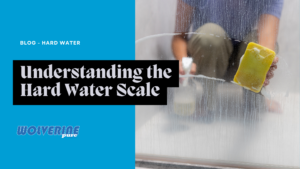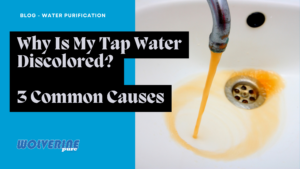Hard water has a habit of making its presence known. Its signature crusty appearance makes it hard to miss — from spotty dishes to nasty mineral buildup on your faucets to that not-quite-yet-clean feeling when you wash your hands. If this is the case in your home, you’re not alone. Nearly 85% of homes in the United States have hard water.
But hard water is more than just annoying. If left unchecked, hard water mineral buildup can lead to inefficient or broken appliances and expensive whole-home plumbing issues. While hard water is technically safe to drink and cook with, it’s a good idea to assess the hardness level of your home’s water and install a water softener or whole home water purification system.
What is Hard Water?
Hard water is full of extra minerals, like calcium and magnesium. These extra minerals are picked up as the water travels through mineral-rich soil during the water cycle. The average level of hardness in a home can change from region to region across the United States.
The only way to combat the negative effects of hard water in your home is to install a whole-home water softener or purification system. But first, you’ll need to uncover just how hard your home’s water really is.
Testing Your Home’s Hardness Level
There are many in-home water tests that will measure the hardness or mineral content of your water. If you don’t want to test your own water, you can schedule a free 20-minute in-home water test with one of our Wolverine Water experts.
Typically, hard water tests feature a test strip that you dip into a glass of tap water. The test strip will react with the minerals present in your water and are designed to reveal different colors depending on the concentration of minerals. The side of the bottle often includes a color scale to help you interpret the results.
Understanding the Results
A water’s hardness level is measured in grains per gallon (GPG). A grain is a unit of measurement for minerals and can be assessed with a chemical analysis. For reference, a tablet of aspirin weighs about 5 grains.
So if your water has a 5 gpg hardness level, it would be like dissolving an aspirin tablet worth of calcium and magnesium into that gallon of water. Water with 10 gpg (considered very hard), would be like dropping two aspirin tablets worth of excess minerals into that gallon of water.
Anything over 7 grains per gallon is considered hard water. Most people find water at 10.5 hardness to be objectionable.
While these are helpful guidelines for assessing the hardness of your home’s water, consider these numbers alongside your own daily experience of your home’s water. If your water test comes back as only slightly hard or moderately hard but you’re still noticing irksome mineral build-up and inefficient cleaning, it’s a good idea to move ahead with a water softening and purification solution.
Schedule a FREE in-home water test today to find out exactly how hard your water is, how it’s affecting your home, and how a whole-home system can help.




